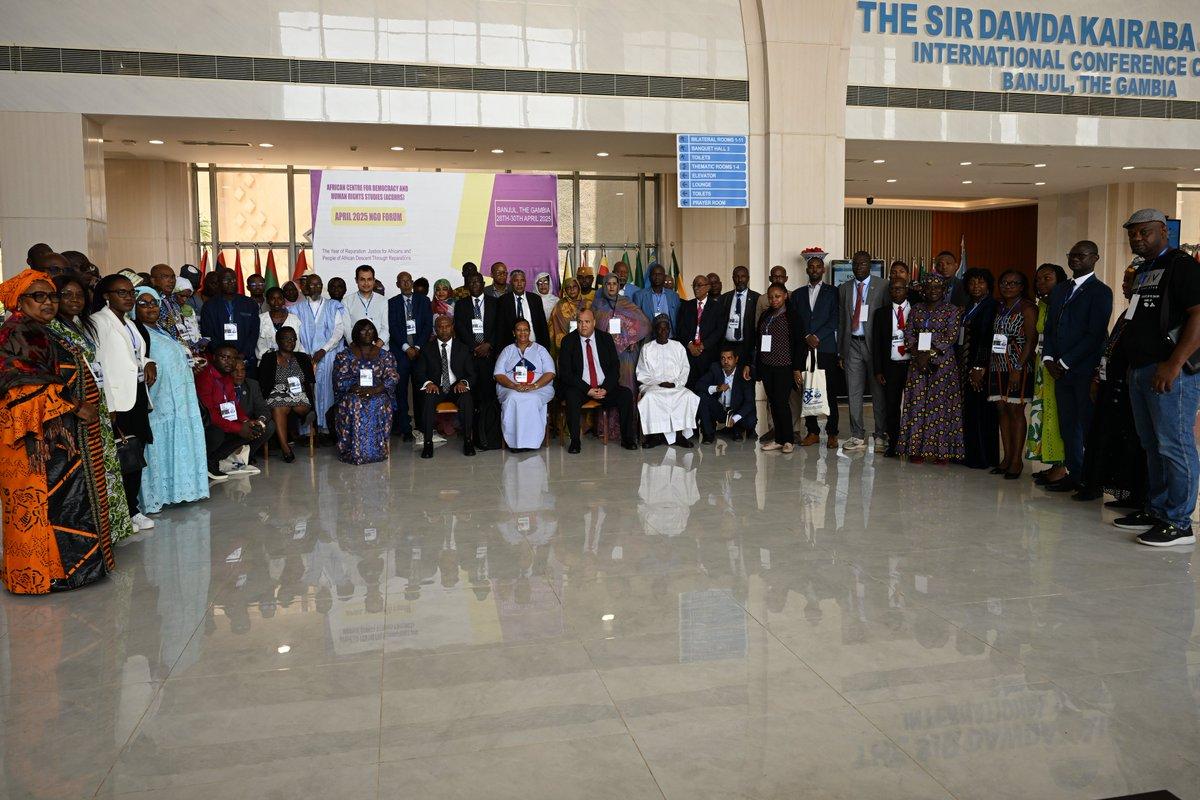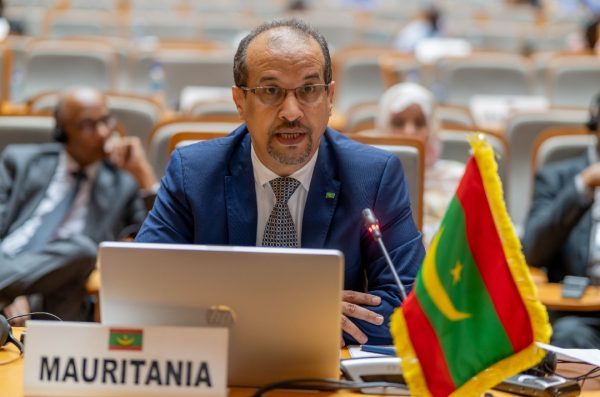
Egypt: Reform unjust vice laws, guarantee open civic space
During Egypt's UPR adoption at HRC59, Nora Noralla delivered a joint statement on behalf of ISHR, Cairo 52 and Middle East Democracy Center. Watch and read the full statement below.
Organisers, Steering Committee and participants during the first day of the NGO Forum held in Banjul, The Gambia, 28 April 2025. Photo credits: ACDHRS

From 28 to 30 April 2025, participants in the NGO Forum held in Banjul, The Gambia, discussed key human rights and democracy issues affecting the continent, as well as the work of defenders. Participants contributed to the adoption of resolutions and recommendations, with a focus on reparations and transitional justice.
From 28 to 30 April 2025, members of civil society organisations working closely with the African Commission on Human and Peoples’ Rights (the African Commission, or ACHPR) attended the NGO Forum held, in person, at the Sir Dawda Kairaba Jawara International Conference Center in Banjul, The Gambia. Discussions during the Forum revolved around the African Union (AU) theme of the Year: ‘Justice for Africans and People of African Descent Through Reparations’. While the Forum was structured into 11 panels on themes relevant to protecting human rights, participants also split into 13 Special Interest Groups to develop recommendations to submit to the African Commission.
In their welcome speeches, all panellists emphasised the need to adopt a survivor-centred approach when addressing the theme of reparations. Recognising the past, documenting violations, analysing the legacy of colonial laws are crucial steps to build a plan for implementations. Reparations is also a look at the present, as we need to combat the contemporary forms of modern slavery, systematically addressing inequalities, like lack of education.
As mentioned by Gilbert Sebihogo, NANHRI Executive Director, ‘cultural measures are needed like supporting artistic communities, languages etc. Institutional reforms must include a transparent governance system, institutional accountability and governmental structure which is responsive of the need of victims’.
The call for reparation is not merely addressing the past but rather addressing systematic exploitation, it’s a pact toward healing and demand for dignity.Hannah Foster, Director of ACDHRS
Commissioner Rémy Ngoy Lumbu insisted on the multidimensional aspects of reparatory justice, particularly for vulnerable groups, but also the need for accountability from governments and non-State actors.
On a more general note, he congratulated African Center for Democracy and Human Rights Studies (ACDHRS) for the organisation of the Forum, in the context of financial cuts and uncertainty.
Today, we are not crying History but we reclaim justice.Commissioner Rémy Ngoy Lumbu
In Central Africa, while REDHAC welcomed the adoption of a new law to protect human rights defenders in the Central African Republic and a relatively calm election process in Gabon, the situation for civil society organisations remain critical. Indeed, the activities of the said network were recently suspended by authorities in Cameroon, and their offices robbed. The agreement of several other organisations , such as Un Monde d’avenir haven’t been renewed for opaque reasons. The network calls on citizens to use the forthcoming elections process as an opportunity for collective mobilisation.
In Eastern Africa, Marie Louise Baricako depicted a dire situation for human rights combined with a complex humanitarian crisis in Somalia and in the Tigray region of Ethiopia, the increase of enforced disappearances in Burundi, and the recent crackdown on journalists observed in Uganda. She called on States to respect the African Charter on Human and Peoples’s Rights.
In North Africa, ‘the judiciary has been used to prosecute activists rather than serving justice’, as mentionned during the panel. Governments are using laws to discredit activists, and human rights defenders are facing arbitrary arrests, detentions. A specific call was made to advance women’s rights, noting unequal access to healthcare. Attention was paid to the deteriorating situation of migrants from sub-Saharan countries victims of racism, unlawful arrests and torture.
Restrictions on freedom of expression and freedom of assembly were highlighted in the report about Western Africa, with strong concerns for press freedom in Togo, and restrictive protests in Côte d’Ivoire (particularly with the arrests of professors and students) and Sierra Leone.
In Southern Africa, LGBTIQ+ activists still face many challenges, particularly in South Africa and Zimbabwe, with an increasing killings record. The network called on the immediate revision of several problematic laws that were recently passed and restrict the work of civil society organisations, such as the cybersecurity bill in Zambia.
Finally, Emílio José Manuel, focal point of the platform for lusophone countries, emphasised challenges at the national level in guaranteeing and protecting human rights, especially in education, health and social services protection, as well as anti-NGO laws in Angola and restrictions on civic space.
Several panels, including the inaugural one based on The Historical Context, Legal Foundations, and Mental Health Impacts of Reparations, focused on the importance of foundations of the discussions held at the NGO Forum to move forward. Henrietta Ekefre (Africa Reparations Programme Lead, Africa Judges and Jurists Forum) recalled the causes of this year’s topic and the claims for justice and reparation for Africans and their descendants. Transatlantic slavery, colonialism and apartheid led to the exploitation of resources, the devaluation and even suppression of certain Indigenous languages, and the establishment of a separation between peoples and races. She added that these events led to the alteration of African culture and religion, and the displacement of works of art and worship.
Giving the example of the genocide in Namibia, the constant human rights violations in the Democratic Republic of Congo and the slavery past of the Gambia, speakers emphasised the intergenerational trauma caused by these tragedies.
Gretchen Rohr, Senior Strategic Advisor on Reparations spoke of the victims’ pending redress for the injustices they suffered. On the measures to be adopted to avoid the repetition of such acts, she indicated the need to write down the history so that it can be transmitted and the necessity to organise discussions to share experiences with the younger generation so that the intergenerational memory can be preserved. She also added the need for an express public apology to ease the pain of the victims.
The NGO Forum highlighted the importance of taking into considerations groups and communities that have been particularly affected by harmful colonial laws, which still have consequences today on women, LGBTIQ+ people, Indigenous Peoples, climate activists and diaspora. In the special interest group on human rights defenders that ISHR participated in, participants also mentioned that decriminalisation of defenders imprisoned or judged during the colonial era must be implemented and that the government shall not duplicate laws inspired by the former colonies or misusing the legal framework to shrink civic space.
Countries must hold internal and external discussions on reconciliation and debates on reparatory justice. While some Commissions do exist, for instance in Tunisia or Angola, civil society organisations present during the Forum noted a strong lack of implementation of decision or even attempts to discredit those institutions. Survivors need compensations, documentation and accountability, not only in terms of monetary nature but as a holistic process. Religious and traditional leaders shall play a crucial role in the path to reparations to ensure dialogue, reconciliation and healing process.
A global call for collective actions to eradicate traditional and modern forms of slavery was made through the Resolution ACHPR/Res.619 (LXXXI) 2024 passed by the African Commission on Human and Peoples’ Rights on Communities Discriminated Against Based on Work and Descent.
Dr. Feyi Ogunade, Regional Organized Crime Observatory Coordinator for West Africa, in ENACT, stressed also the importance of combating modern slavery taken on by Transnational Organisation Crimes (TOCs) and the importance for defenders to document this phenomenon and bring it to the ACHPR. SIHA has documented over 200 cases of disappearing and trafficking of women in the context of TOCs.
The reparations agenda aims to address historical injustices while tackling contemporary issues like systemic racism, economic exclusion, and Africa’s marginalisation in global decision-making. It represents a call for unity among Africans and the African diaspora to advocate for justice, equity, and redress. The adopted Resolution on Africa’s Reparations Agenda and the Human Rights of Africans in the Diaspora and People of African Descent Worldwide (ACHPR/Res.543 (LXXIII) 2022) provides a strong advocacy opportunity.
To further the work already started by the African Commission, especially with regards to connecting the diasporic civil society and stakeholders in the implementation of the theme’s roadmap, it was important to use the opportunity of the Forum to strengthen the understanding of all stakeholders on the theme’s scope, its objectives, and the strategies that could be put in place to ensure its implementation.
Participants in the NGOs Forum adopted 11 country resolutions, 6 thematic resolutions and 1 thematic recommendation.
Recommendation on people with disabilities, especially women and children

During Egypt's UPR adoption at HRC59, Nora Noralla delivered a joint statement on behalf of ISHR, Cairo 52 and Middle East Democracy Center. Watch and read the full statement below.

The 59th session of the UN Human Rights Council (16 June to 9 July 2025) will consider issues including civil society space, climate change, sexual orientation and gender identity, violence and discrimination against women and girls, poverty, peaceful assembly and association, and freedom of expression, among others. It will also present an opportunity to address grave human rights situations including in Afghanistan, Belarus, China, Eritrea, Israel and oPt, Sudan, Syria and Venezuela, among many others. Here’s an overview of some of the key issues on the agenda.

In compliance with Article 62 of the African Charter, States have the obligation to report every two years on the legislative, administrative and political measures taken with a view to give effect to human rights guaranteed by the Charter. The Islamic Republic of Mauritania, which ratified the Charter in 1986, submitted its 15th-16th and 17th Periodic Reports for its review.